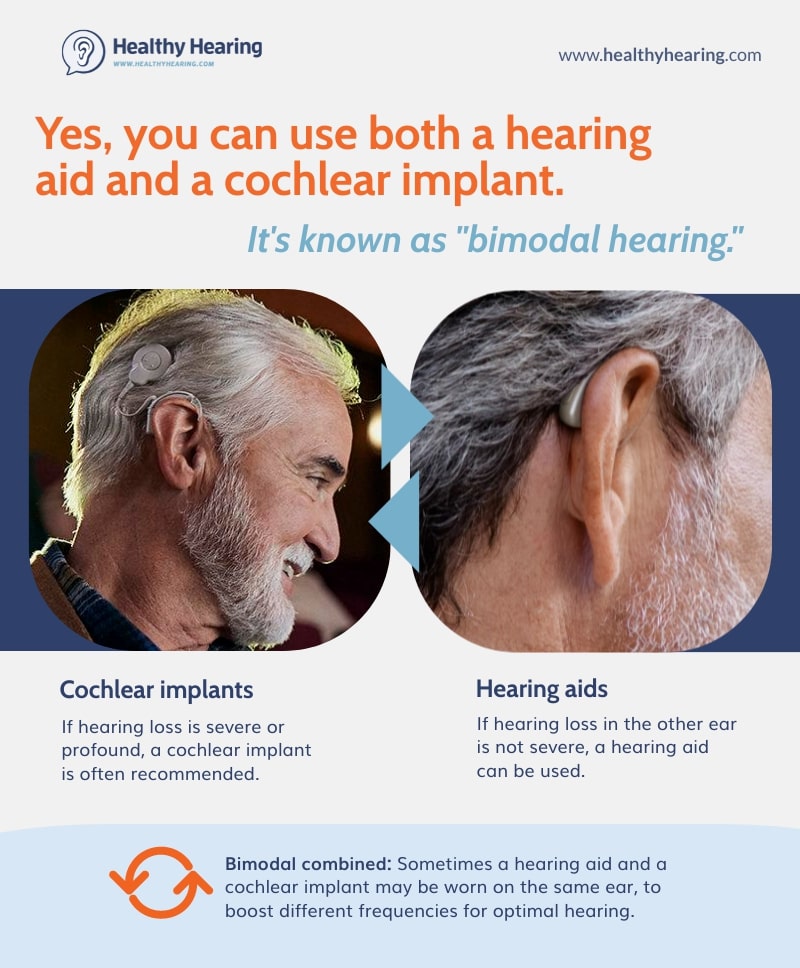|
www.HealthyHearing.com |
Can I wear a cochlear implant in one ear and a hearing aid in the other?Why 'bimodal hearing' may be the best option for you
Contributed by Joy Victory, managing editor, Healthy Hearing For many people, two hearing aids will work just fine for helping with hearing loss. For others, though, it's a better idea to use a cochlear implant in one ear and a hearing aid in the other—or a similar combination, notes Sarah A. Sydlowski, AuD, Cleveland Clinic’s Audiology Director, Hearing Implant Program, and former president of the American Academy of Audiology. Both devices can help treat sensorineural hearing loss, the most common type of hearing loss, which relates to the nerves that help convert noise into sound. This often happen when microscopic sensory cells in your inner ear aren’t working the way they used to, which is common with aging or noise exposure (or both).
Hearing aids vs cochlear implants (and why both may help)Hearing aidsWhat are hearing aids and how do they help? Hearing aids use a sophisticated sound processor and microphone to amplify certain sounds so that your remaining sensory cells are stimulated adequately. What are the drawbacks? When too many hearing cells are poorly functioning, sound may seem louder with hearing aids, but not clearer. That’s when it makes sense to have a cochlear implant. Cochlear implantsWhat about cochlear implants? A cochlear implant is a small electronic device that consists of an external device and a surgically implanted internal portion. The external portion sits behind the ear and consists of a microphone, speech processor, and signal transmitter. The internal portion is surgically placed under the skin behind the ear and consists of a signal receiver and an electrode array. Rather than making sounds louder, the electrode array of a cochlear implant takes electrical impulses from the receiver and sends them directly to the hearing nerve. This results in better clarity, especially for understanding speech. What are the drawbacks? Hearing via a cochlear implant doesn’t sound the same as natural hearing because it provides sound by bypassing the sensory cells in the inner ear. Sometimes the best solution is to use bothA cochlear implant provides improved sound clarity, Sydlowski says. Hearing aids, meanwhile, provide balance and sound directionality (knowing where sound is coming from), an improved ability to hear speech in noise, and better musical clarity. Hearing aids and cochlear implants offer unique benefits and drawbacks. Fortunately, they can be used together in varying combinations to maximize the benefits. Bilateral, bimodal and bimodal combined hearingDepending on your hearing loss and lifestyle concerns, your audiologist may recommend one of the following hearing configurations:
Transitioning to a cochlear implantBecause most adults still have some natural hearing in one or both ears, Dr. Sydlowski said it’s common to receive an implant in only one ear initially. 
connected, reducing the risk of social isolation. If the hearing in the unimplanted ear continues to decrease or the hearing aid doesn't provide enough benefit, a second cochlear implant will be considered. Go deeper: Cochlear implants for older adults Ask about cochlear implants sooner rather than laterWhen it comes to optimal hearing, two ears are always better than one, Dr. Sydlowski said. “We don’t have one ear as a spare–it serves a purpose,” she said. “The earlier you pursue appropriate management of your hearing loss, the better the outcomes are. It does not pay to wait.” Only about 2% of people who could benefit from a cochlear implant have one, she explained. “Cochlear implants have long been thought of as a last resort and something to try when hearing aids don’t work at all. This is very outdated," she said. Bottom line: "Today we know that cochlear implants are most successful the earlier they are recommended and pursued. Some people are scared to make the leap to a cochlear implant, but I hear ‘I wish I’d done this sooner’ more than anything else," she added. Go deeper: How we hear, explained. Freelance writer Debbie Clason contributed to this article. She has more than 40 years experience as a journalist, corporate marketing director and freelance writer and owns the marketing and communication business Clason Communcations. Joy Victory, managing editor, Healthy Hearing
Related Help Pages:
Hearing aids Health benefits Types and styles Technology Fitting Cochlear implants
|
Featured clinics near me
Earzlink Hearing Care - Reynoldsburg
7668 Slate Ridge Blvd
Reynoldsburg, OH 43068
HearingLife - Pickerington
10501 Blacklick Eastern Rd Suite 700
Pickerington, OH 43147


Find a clinic
We have more hearing clinic reviews than any other site!



 Joy Victory has extensive experience editing consumer health information. Her training in particular has focused on how to best communicate evidence-based medical guidelines and clinical trial results to the public. She strives to make health content accurate, accessible and engaging to the public.
Joy Victory has extensive experience editing consumer health information. Her training in particular has focused on how to best communicate evidence-based medical guidelines and clinical trial results to the public. She strives to make health content accurate, accessible and engaging to the public.